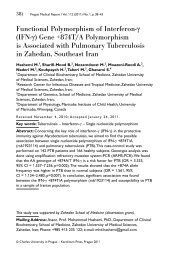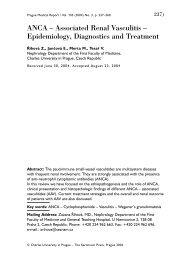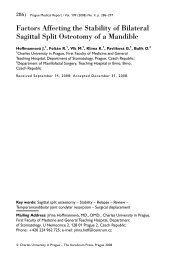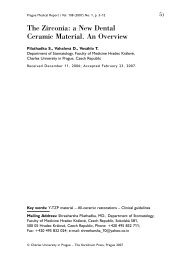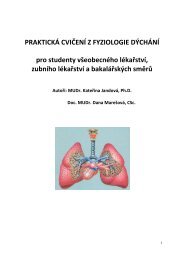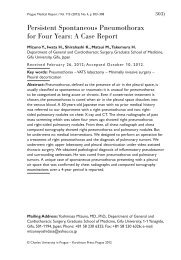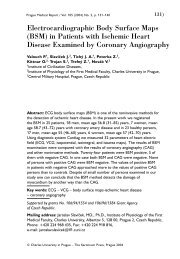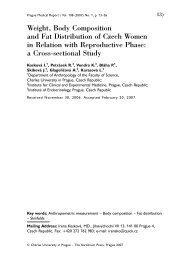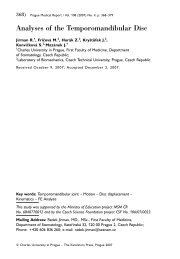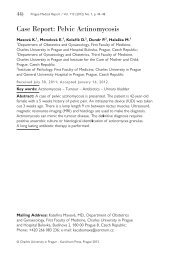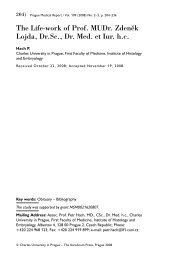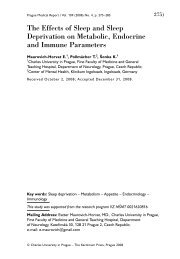The Disease of Franz Kafka - Prague Medical Report
The Disease of Franz Kafka - Prague Medical Report
The Disease of Franz Kafka - Prague Medical Report
Create successful ePaper yourself
Turn your PDF publications into a flip-book with our unique Google optimized e-Paper software.
<strong>Prague</strong> <strong>Medical</strong> <strong>Report</strong> / Vol. 106 (2005) No. 3, p. 307–313<br />
307)<br />
<strong>The</strong> <strong>Disease</strong> <strong>of</strong> <strong>Franz</strong> <strong>Kafka</strong><br />
Mydlík M., Derzsiová K.<br />
Nephrological Clinic <strong>of</strong> the <strong>Medical</strong> Faculty <strong>of</strong> P. J. Šafárik University<br />
and the Faculty Hospital <strong>of</strong> L. Pasteur, Košice, Slovak Republic<br />
Received June 6, 2005, Accepted July 6, 2005<br />
<strong>The</strong> paper was given as a lecture in the 2 nd Memorial Meeting <strong>of</strong> <strong>Franz</strong> <strong>Kafka</strong><br />
on November 5, 2004 in Tatranská Lomnica, the High Tatras and in the 12 th Memorial<br />
<strong>Medical</strong> Meeting <strong>of</strong> Pr<strong>of</strong>essor F. Pór, M.D., on April 25, 2005 in Košice, Slovak Republic.<br />
Key words: <strong>Franz</strong> <strong>Kafka</strong> – Lung Tuberculosis – Monument <strong>of</strong> <strong>Franz</strong> <strong>Kafka</strong><br />
– Tatranské Matliare – <strong>The</strong> High Tatras – Slovak Republic<br />
Mailing Address: Pr<strong>of</strong>. Miroslav Mydlík, MD., DSc., Nephrological Clinic<br />
<strong>of</strong> University Hospital <strong>of</strong> L. Pasteur, <strong>Medical</strong> School <strong>of</strong> University <strong>of</strong> P. J. Šafárik,<br />
Rastislavova 43, 041 90 Košice, Slovak Republic, e-mail: k.derzsiova@fnlp.sk<br />
<strong>The</strong> <strong>Disease</strong> <strong>of</strong> <strong>Franz</strong> <strong>Kafka</strong>
308) <strong>Prague</strong> <strong>Medical</strong> <strong>Report</strong> / Vol. 106 (2005) No. 3, p. 307–313<br />
Abstract: On June 3, 2004, 80 years have passed since the death <strong>of</strong> one <strong>of</strong> the<br />
greatest and the most important world writers <strong>of</strong> 20 th century, the <strong>Prague</strong> German<br />
writer <strong>Franz</strong> <strong>Kafka</strong>. On November 5, 2004 we reminded that remarkable<br />
anniversary, which was also the 3rd anniversary <strong>of</strong> revelation <strong>of</strong> the monument <strong>of</strong><br />
<strong>Franz</strong> <strong>Kafka</strong> in Tatranské Matliare, the High Tatras. <strong>Franz</strong> <strong>Kafka</strong> suffered from lung<br />
tuberculosis from 1917 until his death 1924. He was treated on lung tuberculosis<br />
in the sanatorium “Villa Tatra“ from December 20, 1920 until August 27, 1921 in<br />
Tatranské Matliare, the High Tatras. Lung tuberculosis was a very dangerous<br />
disease in that time and the treatment by dietotherapy, climatotherapy and<br />
symptomatic therapy without antituberculotic drugs was less effective in many<br />
patients. In the paper the disease <strong>of</strong> <strong>Franz</strong> <strong>Kafka</strong> was described according to<br />
available literature.<br />
On June 3, 2004, 80 years have passed since the death <strong>of</strong> one <strong>of</strong> the world<br />
greatest and the most influential writers <strong>of</strong> the beginning <strong>of</strong> the twentieth century,<br />
the <strong>Prague</strong> German writer <strong>Franz</strong> <strong>Kafka</strong> [1, 2, 3]. Apart <strong>of</strong> this, on May 16, 2004<br />
three years have passed from the revealing <strong>of</strong> <strong>Franz</strong> <strong>Kafka</strong>’s monument in<br />
Tatranské Matliare, the High Tatras. <strong>Franz</strong> <strong>Kafka</strong> is the author <strong>of</strong> three novels –<br />
Not Heard (America), (1912), <strong>The</strong> Trial (1914), <strong>The</strong> Castle (1922), the author <strong>of</strong><br />
many short stories (Transformation, Verdict, A Country Doctor, A Hunger Artist,<br />
Description <strong>of</strong> a Fight and others), the author <strong>of</strong> letters devoted to his relatives<br />
Figure 1 – <strong>The</strong> monument <strong>of</strong> <strong>Franz</strong> <strong>Kafka</strong> in Tatranské Matliare, the High Tatras.<br />
Mydlík M., Derzsiová K.
<strong>Prague</strong> <strong>Medical</strong> <strong>Report</strong> / Vol. 106 (2005) No. 3, p. 307–313<br />
309)<br />
and friends (the best known are letters to Milena Jesenská), aphorisms and other<br />
literary texts including his own diary. With <strong>Franz</strong> <strong>Kafka</strong>’s personality the <strong>Prague</strong><br />
German literature reached its artistic peak. It reflected complicated cultural and<br />
social situation <strong>of</strong> that time as well as author’s own fantastic, fearful, inquiring and<br />
irreproducible depiction <strong>of</strong> world vision. <strong>Franz</strong> <strong>Kafka</strong>’s literary work is nowadays<br />
understood as an urgent and desperate warning against the dehumanized world<br />
and belongs to the everlasting values <strong>of</strong> the world literature.<br />
Authors <strong>of</strong> this paper being also the main initiators <strong>of</strong> building and revealing<br />
<strong>Franz</strong> <strong>Kafka</strong>’s monument in Tatranské Matliare, as well as initiators <strong>of</strong> the First<br />
Memorial Meeting <strong>of</strong> <strong>Franz</strong> <strong>Kafka</strong> in Tatranské Matliare in 2001 (Figure 1), [4, 5],<br />
decided to organize the Second Memorial Meeting <strong>of</strong> <strong>Franz</strong> <strong>Kafka</strong> in the same<br />
place on the occasion <strong>of</strong> about mentioned anniversaries (Figure 2).<br />
<strong>The</strong> first part <strong>of</strong> the 2 nd Memorial Meeting <strong>of</strong> <strong>Franz</strong> <strong>Kafka</strong> took place on<br />
November 5, 2004 at his monument in Tatranské Matliare. A lot <strong>of</strong> important<br />
personalities participated – among them RNDr. M. Mališová, Head <strong>of</strong> <strong>Franz</strong> <strong>Kafka</strong>’s<br />
Centre in <strong>Prague</strong>, Ing. M. Šturcel from “Štátne lesy” <strong>of</strong> Tatra’s National Park in<br />
Tatranská Lomnica, Pr<strong>of</strong>essor A. Jenča, MD., PhD., Dean <strong>of</strong> the <strong>Medical</strong> Faculty<br />
<strong>of</strong> P. J. Šafárik University in Košice. In the opening part <strong>of</strong> the Memorial Meeting<br />
A. Jurečková from the Municipal Authorities in Starý Smokovec, the High Tatras<br />
presented the prose <strong>of</strong> <strong>Franz</strong> <strong>Kafka</strong> “An Unexpected Walk”. On closing <strong>of</strong> the first<br />
part <strong>of</strong> 2 nd Memorial Meeting <strong>of</strong> <strong>Franz</strong> <strong>Kafka</strong>, Lucia Vaníčková, student<br />
Figure 2 – <strong>The</strong> programme <strong>of</strong> the 2 nd Memorial<br />
Meeting <strong>of</strong> <strong>Franz</strong> <strong>Kafka</strong>, which was held<br />
in Tatranské Matliare and Tatranská Lomnica<br />
on November 5, 2004.<br />
<strong>The</strong> <strong>Disease</strong> <strong>of</strong> <strong>Franz</strong> <strong>Kafka</strong>
310) <strong>Prague</strong> <strong>Medical</strong> <strong>Report</strong> / Vol. 106 (2005) No. 3, p. 307–313<br />
<strong>of</strong> the 5 th grade <strong>of</strong> State Conservatorium in Košice, performed a composition for<br />
the violin from the second score d-mol “Sarabanda Guige” by J. S. Bach (Figure 3).<br />
<strong>The</strong> second part <strong>of</strong> 2 nd Memorial Meeting <strong>of</strong> <strong>Franz</strong> <strong>Kafka</strong> continued in the<br />
Information Centre <strong>of</strong> “Štátne lesy” Tatra’s National Park in Tatranská Lomnica.<br />
After the opening speech <strong>of</strong> Pr<strong>of</strong>essor M. Mydlík, MD., DSc., the programme<br />
proceeded further by the speech <strong>of</strong> Ing. M. Šturcel, representative <strong>of</strong> “Štátne lesy”<br />
Tatra’s National Park, who welcomed the guests and participants. In the following<br />
two lectures JUDr. J. Gašpar, director <strong>of</strong> the State Scientific Library in Košice, had<br />
a speech on the history <strong>of</strong> Tatranské Matliare and simultaneously he presented<br />
the history showing some historical pictures on the posters including the stay <strong>of</strong><br />
<strong>Franz</strong> <strong>Kafka</strong> in Tatranské Matliare. Mag. Ľ. Rusnáková from library in Poprad<br />
described the relationship between <strong>Franz</strong> <strong>Kafka</strong> and Max Brod during his stay in<br />
the High Tatras.<br />
<strong>The</strong> programme continued with lecture by Pr<strong>of</strong>essor M. Mydlík, MD., DSc., and<br />
Ing. K. Derzsiová from the Nephrological Clinic <strong>of</strong> the <strong>Medical</strong> Faculty <strong>of</strong> P. J. Šafárik<br />
University and Faculty Hospital <strong>of</strong> L. Pasteur in Košice. <strong>The</strong> paper dealt with <strong>Franz</strong><br />
<strong>Kafka</strong>’s disease, which to some extent influenced his literary work (Figure 4), [6].<br />
From 1917 until his death <strong>Franz</strong> <strong>Kafka</strong> suffered from lung tuberculosis, but<br />
despite this, he continued in writing intermittently till the end <strong>of</strong> his life.<br />
Tuberculosis was at that time a disease that was hard to cure without<br />
Figure 3 – <strong>The</strong> view on the first part <strong>of</strong> the 2nd Memorial Meeting <strong>of</strong> <strong>Franz</strong> <strong>Kafka</strong>, which was held<br />
on November 5, 2004 in Tatranské Matliare.<br />
Mydlík M., Derzsiová K.
<strong>Prague</strong> <strong>Medical</strong> <strong>Report</strong> / Vol. 106 (2005) No. 3, p. 307–313<br />
311)<br />
contemporary possibilities to use antituberculotic drugs. His disease was<br />
manifested by haemoptoe during the night from 12 th to 13 th August 1917 in his flat<br />
in Schönborn Palace in <strong>Prague</strong>-Malá Strana. Haemoptoe has been repeated on<br />
the following night [1].<br />
In the following years <strong>Franz</strong> <strong>Kafka</strong> underwent some therapeutic stays in various<br />
villages and sanatoriums (Siřem, Turnov and Želízy in Czechoslovakia and Merano<br />
in Italy). From December 20, 1920 to August 27, 1921 <strong>Franz</strong> <strong>Kafka</strong> was treated in<br />
the sanatorium “Villa Tatra” in Tatranské Matliare, the High Tatras (Figure 5).<br />
It was his longest stay during his relatively short but very active life that he spent<br />
outside <strong>Prague</strong> [1].<br />
It was known till nowadays that <strong>Franz</strong> <strong>Kafka</strong> has written only one text “Aus<br />
Matlárháza” during his stay in Tatranské Matliare. <strong>The</strong> text was published in the<br />
journal “Karpathen-Post” 42, 1921, No. 17, p. 1 about exhibition <strong>of</strong> the amateur<br />
water-colour painter Antonín Holub. Jiří Stromšík, one <strong>of</strong> the members <strong>of</strong> editorial<br />
staff <strong>of</strong> <strong>Kafka</strong>’s collected works, translated the fragment and the prose <strong>of</strong> <strong>Franz</strong><br />
<strong>Kafka</strong> “Writing is denied” and “Away from here”. According to J. Stromšík these<br />
texts were written by <strong>Franz</strong> <strong>Kafka</strong> in February 1921 that means during his stay in<br />
Tatranské Matliare. <strong>The</strong> texts were published in the third volume <strong>of</strong> <strong>Kafka</strong>’s<br />
collected works: Short stories III (<strong>The</strong> Married Couple and other texts from<br />
inheritance) pp. 102–104, the Work <strong>of</strong> <strong>Franz</strong> <strong>Kafka</strong>, Vol. III, <strong>Kafka</strong>’s Publishing<br />
Figure 4 – <strong>The</strong> view on the second part <strong>of</strong> the 2nd Memorial Meeting <strong>of</strong> <strong>Franz</strong> <strong>Kafka</strong>, which was held on<br />
November 5, 2004 in Information Centre <strong>of</strong> “Štátne lesy” Tatra’s National Park in Tatranská Lomnica,<br />
the High Tatras.<br />
<strong>The</strong> <strong>Disease</strong> <strong>of</strong> <strong>Franz</strong> <strong>Kafka</strong>
312) <strong>Prague</strong> <strong>Medical</strong> <strong>Report</strong> / Vol. 106 (2005) No. 3, p. 307–313<br />
house, <strong>Prague</strong> 2003, 363 pp. Apart from these literary texts <strong>Franz</strong> <strong>Kafka</strong> wrote<br />
a lot <strong>of</strong> letters from Tatranské Matliare: Letters to his sisters Elli, Valli and Ottla<br />
(12 letters), to his brother-in-law David, to his friend Max Brod (18 letters) and to<br />
Minza Eisner (3 letters), [ 7, 8].<br />
Max Brod was his best and closest friend, author <strong>of</strong> his curriculum vitae and<br />
postmortal publisher <strong>of</strong> his work. He sent him a questionnaire to Tatranské<br />
Matliare concerning his state <strong>of</strong> health. <strong>Franz</strong> <strong>Kafka</strong> answered the questionnaire in<br />
such a way: weight increased 8 kg; total weight 65 kg; objective pulmonary<br />
findings secret <strong>of</strong> physician, supposedly good; fever mostly without fever;<br />
breathing was not good, especially during the cold winter months; signature:<br />
the only question, that embarrassed and confused <strong>Franz</strong> <strong>Kafka</strong> [9]. During his stay<br />
in Tatranské Matliare <strong>Franz</strong> <strong>Kafka</strong> suffered from total weakness and lack <strong>of</strong><br />
appetite. Moreover, he had got increased temperature and suffered from irritative<br />
and productive cough and he overcame pneumonia during his stay in the High<br />
Tatras. In Tatranské Matliare <strong>Franz</strong> <strong>Kafka</strong> was treated according to the standards<br />
<strong>of</strong> that time: bed rest during the day, lying on the balcony as a method <strong>of</strong><br />
climatotherapy. He was on a diet with a large amount <strong>of</strong> milk, he took antipyretic<br />
drugs, codeine and other symptomatic drugs and in this way, the physicians tried<br />
to reduce symptoms <strong>of</strong> lung tuberculosis [10]. During his stay in Tatranské Matliare<br />
<strong>Franz</strong> <strong>Kafka</strong> got acquainted with another patient, Robert Klopstock, who was a<br />
student <strong>of</strong> medicine and who became his friend.<br />
After <strong>Franz</strong> <strong>Kafka</strong> left Tatranské Matliare his health status did not change<br />
significantly so he proceeded in curative stays in the spas: Špindlerův Mlýn, Planá<br />
n/Lužnicí and in German spa Müritz near the Baltic sea. In the spa Müritz <strong>Franz</strong><br />
<strong>Kafka</strong> met Dora Diamant who became his life partner during his stay in Berlin<br />
in 1923, and she was also present at his death-bed together with Robert<br />
Klopstock, MD.<br />
In March 1924 Robert Klopstock, MD., found out loss <strong>of</strong> the voice in the patient<br />
<strong>Franz</strong> <strong>Kafka</strong> and in April 1924 at the Otorhinolaryngological Clinic <strong>of</strong> Pr<strong>of</strong>essor<br />
Hajek in the General Hospital in Vienna (Austria), this was pr<strong>of</strong>essionally judged as<br />
laryngophthisis. <strong>Franz</strong> <strong>Kafka</strong> was moved with progressive lung tuberculosis and<br />
laryngophthisis from the Otorhinolaryngological Clinic in Vienna to H<strong>of</strong>fmann’s<br />
Figure 5 – Sanatorium “Villa Tatra”,<br />
in which <strong>Franz</strong> <strong>Kafka</strong> was treated on lung<br />
tuberculosis from December 20, 1920<br />
to August 27, 1921 in Tatranské Matliare.<br />
Mydlík M., Derzsiová K.
<strong>Prague</strong> <strong>Medical</strong> <strong>Report</strong> / Vol. 106 (2005) No. 3, p. 307–313<br />
313)<br />
MD., sanatorium in Kierling, today it is a part <strong>of</strong> Klosterneuburg not far from<br />
Vienna, where he died among his friends on June 3, 1924.<br />
<strong>The</strong> last short story written by <strong>Franz</strong> <strong>Kafka</strong> in <strong>Prague</strong>, in the period from March<br />
19 to April 4, 1924, was “Singer Josephine – or – a mouse nation”, and probably<br />
marked with his developed laryngophthisis. <strong>The</strong> funeral <strong>of</strong> <strong>Franz</strong> <strong>Kafka</strong> was held at<br />
the Jewish Cemetery in <strong>Prague</strong>-Strašnice, on June 11, 1924.<br />
Second Memorial Meeting <strong>of</strong> <strong>Franz</strong> <strong>Kafka</strong> was organized in closed cooperation<br />
with Municipal Authorities in Starý Smokovec and “Štátne lesy” Tatra’s National<br />
Park in Tatranská Lomnica on the occasion <strong>of</strong> the 80 th anniversary <strong>of</strong> <strong>Franz</strong> <strong>Kafka</strong>’s<br />
death and third anniversary <strong>of</strong> revealing <strong>of</strong> the monument for this remarkable<br />
personality <strong>of</strong> the world literature in Tatranské Matliare. <strong>The</strong> celebration was held<br />
in the festive atmosphere. This ceremony showed that the cultural public in the<br />
High Tatras and the whole region <strong>of</strong> Eastern Slovakia honoured the memory <strong>of</strong><br />
<strong>Franz</strong> <strong>Kafka</strong>.<br />
References<br />
1. WAGENBACH K.: <strong>Franz</strong> <strong>Kafka</strong> . Second edit., <strong>Prague</strong> 1993, 179 pp. (in Czech).<br />
2. BROD M.: <strong>Franz</strong> <strong>Kafka</strong>, Biography. First edit., Odeon, <strong>Prague</strong> 1966, 290 pp. (in Czech).<br />
3. BROD M.: <strong>Franz</strong> <strong>Kafka</strong>, Biography. Second edit. Publishing House <strong>of</strong> <strong>Franz</strong> <strong>Kafka</strong>, <strong>Prague</strong> 2000, 228 pp.<br />
(in Czech).<br />
4. MIŠKUFOVÁ H.: <strong>Franz</strong> <strong>Kafka</strong> in the High Tatras. Česká Beseda 7: 9, 2001. (in Slovak).<br />
5. MYDLÍK M., DERZSIOVÁ K.: <strong>Franz</strong> <strong>Kafka</strong> in Tatranské Matliare. Vnitř. Lék. 48: 60–61, 2001. (in Slovak).<br />
6. MYDLÍK M.: II nd Memorial Meeting <strong>of</strong> <strong>Franz</strong> <strong>Kafka</strong> in Matliare. Tatry 2: 31, 2005. (in Slovak).<br />
7. KAFKA F.: Letters to Ottla and Family. Aurora, <strong>Prague</strong> 1966, 166 pp. (in Czech).<br />
8. KAFKA F.: Tatra’s Letters. Selection from correspodence 1920/1921. Tatra’s Library, Poprad 1997,<br />
54 pp. (in Slovak).<br />
9. KAFKA F. & BROD M.: Friendship, Correspodence. First edit. Hynek, <strong>Prague</strong> 1998, 453 pp. (in Czech).<br />
10. THOMAYER J.: Pathology and <strong>The</strong>rapy <strong>of</strong> Internal <strong>Disease</strong>s. Fifth edit. Bursík & Kohout, <strong>Prague</strong> 1923,<br />
1085 pp. (in Czech).<br />
<strong>The</strong> <strong>Disease</strong> <strong>of</strong> <strong>Franz</strong> <strong>Kafka</strong>



